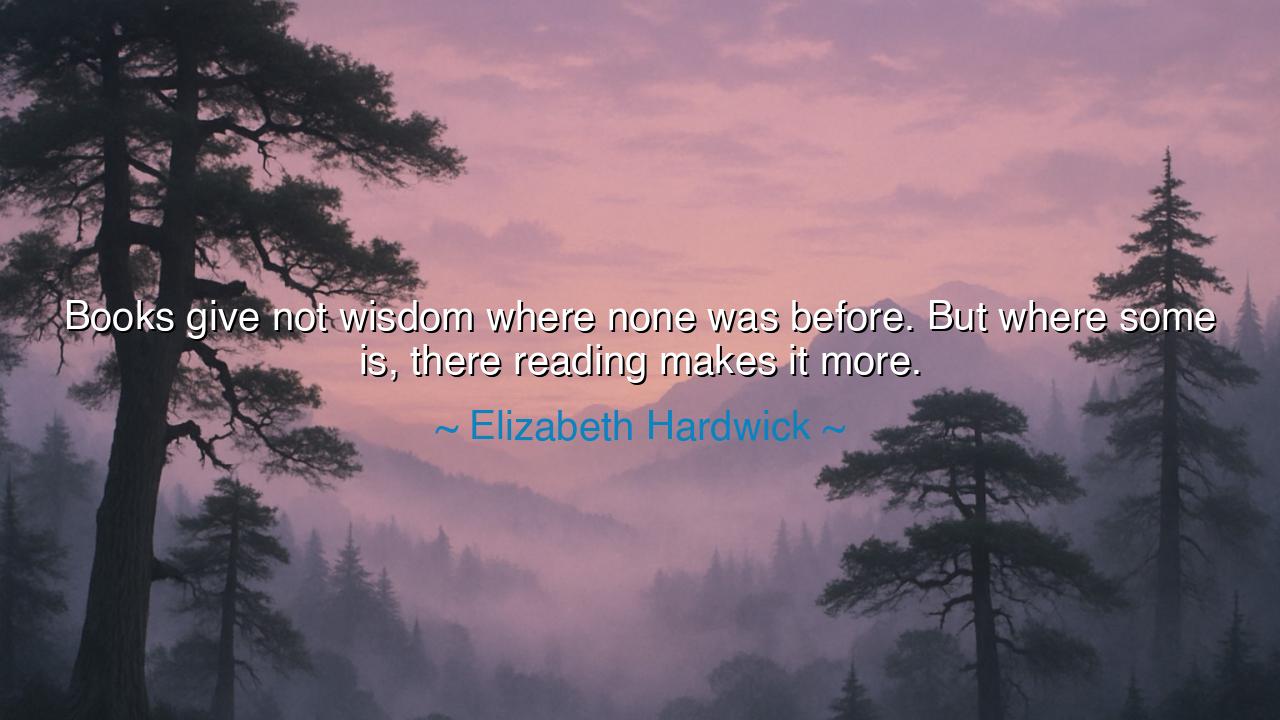
Books give not wisdom where none was before. But where some is
Books give not wisdom where none was before. But where some is, there reading makes it more.






Elizabeth Hardwick, the poet and essayist, spoke with quiet profundity: “Books give not wisdom where none was before. But where some is, there reading makes it more.” In this reflection, she unveils a timeless truth—that wisdom is not something that can be bestowed upon the empty, nor is it simply contained in pages. Books do not create wisdom out of nothing, for wisdom is first an inherent capacity of the soul, something nurtured by experience, reflection, and an open heart. But for those who already possess a kernel of wisdom, reading deepens, expands, and refines that wisdom, leading to greater understanding.
The meaning is profound. To read without prior insight is to consume words without truly digesting them. Books can fill the mind with information, but wisdom requires more than knowledge; it requires the capacity to recognize the truth when it is spoken, to connect ideas with experience, and to apply learning in meaningful ways. It is only those who have some measure of understanding, who possess the seed of wisdom, that will find books to be the fertile soil in which that wisdom can grow.
History affirms this teaching. Consider the great minds of the Renaissance, such as Leonardo da Vinci or Michelangelo, whose genius was not just the result of reading books, but of experiencing life and engaging deeply with the world. Their study of ancient texts, their reading of Plato and Aristotle, did not give them wisdom; it expanded the wisdom they already held, allowing them to build upon it and create works of lasting genius. They did not rely solely on books, but used them as a tool to refine their understanding and expand their capabilities.
The same can be said of Socrates, whose approach to learning was not to read endlessly but to engage others in dialogue. His wisdom came not from the vast accumulation of information but from his ability to question, to seek deeper truths, and to cultivate his own understanding through experience and conversation. For Socrates, books were useful but not the sole source of wisdom; it was through his own internal reflection and interaction with others that his wisdom grew.
Thus, Hardwick’s insight serves as both a caution and a call to action: wisdom is not born from books alone, but from a life engaged with truth, suffering, and joy. Books are tools, not sources, and those who seek wisdom must not look to books to do the work for them. Rather, they should let books expand what is already within them, to transform their seed of wisdom into a fuller and more fertile understanding.
Therefore, let the seeker remember: books are not a substitute for experience, nor can they create wisdom where none exists. But when wisdom is already present, reading nourishes it, guiding the soul to new horizons. The true power of books lies not in their content, but in how they draw out the wisdom that already resides in the heart. Would you like me to also explore how Hardwick’s own literary career was a testament to this belief, as she used her writings to deepen the understanding of her readers?






TKLe the khai
This perspective is thought-provoking because it challenges the idea that books are magic vessels of wisdom. It raises a subjective question: does one’s personal life experience and reflection determine how much one can extract from reading? I also wonder about the balance between innate curiosity and structured learning—does having an eager mind suffice as ‘some wisdom,’ or does one need guidance and context to truly benefit from books?
TDThuy Dung
I feel a sense of realism in this statement. It resonates with experiences where reading alone didn’t immediately change perspectives, but when I had some background or understanding, texts seemed to open new doors of thought. It makes me wonder how educators and mentors can guide learners to cultivate that initial insight before handing them knowledge. Is there a way to make reading more universally transformative, or is it inherently limited by the reader’s starting point?
VTTran van Tu
This idea sparks curiosity about the limits of knowledge transmission. If wisdom cannot simply be absorbed from books, then what differentiates someone who reads extensively and grows wiser from someone who reads the same texts but gains little? Could it be that interpretation, context, and the ability to connect ideas are the essential ingredients, and books are merely tools that magnify existing capacity rather than replace it?
NMPham Ngoc Minh
I find this notion both inspiring and slightly frustrating. It implies that reading alone is insufficient for personal growth unless the reader already possesses some insight. Does that mean those who feel ‘ignorant’ are at a disadvantage? Perhaps the key is engagement and reflection, not passive reading. I also question whether certain books or types of content might be better at sparking that initial spark of understanding, even in someone with limited prior wisdom.
ANW A A N
This makes me reflect on the role of prior knowledge in learning. If someone approaches reading without any foundation, will books alone fail to make them wiser? It raises questions about education and preparation—should we focus on building critical thinking and curiosity first before handing someone knowledge through books? I also wonder whether experiential learning can act as a substitute for that initial wisdom, or if reading merely amplifies what life has already taught us.